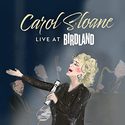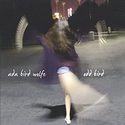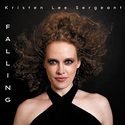|
I've got the word "bird" on the brain lately, and there's a reason. I have been nesting comfortably, listening to female vocalists–called "songbirds" and "thrushes" by some scribes. Two quite senior songbirds have live recordings: Sheila Jordan, whose song topics include a fine-feathered friend and her friend Charlie "Bird" Parker; and from the venue named in his honor, Birdland, we hear Carol Sloane. Then taking flight are two other ladies, each with her third release and both focused on being songwriters: Ada Bird Wolfe with Odd Bird; and Kristen Lee Sergeant with Falling, wherein she chirps 10 things, including "Birdsong."
 SHEILA JORDAN SHEILA JORDAN
LIVE AT MEZZROW
Cellar Music Group
CD, Digital
Recorded last year in performance at a club in downtown Manhattan, Live at Mezzrow finds jazz singer Sheila Jordan still magnificently magnetic on a night one month before her 93rd birthday! The set list includes some material she's put her stamp on over the years, opening with the poignant "Bird Alone" by Abbey Lincoln and even reaching back to something from her 1962 debut album, Portrait of Sheila, for her still impactful and moody take on "Baltimore Oriole" by Hoagy Carmichael/ Paul Francis Webster. And she continues to pay homage to her mentor whose nickname was "Bird" as she sings the sax legend's composition "Confirmation" with lyrics about him, "The Bird." And here's the showtune alert: There are five songs that in days of yore were in Broadway musicals. These have logged frequent flyer miles, covered over the decades and aging well, like the lady singing them.
While no voice can totally escape exposure to the toll of time, this veteran still delivers the goods; she's taking risks, taking listeners for emotional journeys, playing with the notes, more than game to be fully in the game. Sheila Jordan, with her distinctive sound, sensibilities, and skillful scat-singing, boldly soldiers on, not taking the easy path. There wouldn't be much room to hide or slide into the background when the only accompaniment is two musicians: subtle pianist Alan Broadbent and her frequent bass-playing collaborator, Harvey S. (What pros they are!). Her spoken patter includes appreciative comments about them (and she literally sings their praises, too!) and cheeky asides. They get the spotlight to themselves on the two purely instrumental tracks that are dazzling: "Blue in Green," composed by jazz giant Miles Davis, and a varied-tempo exploration of Cole Porter's "What Is This Thing Called Love?"
Back on the vocal side, another Porter sample makes a surprise appearance, as it's not indicated on the song list, even though it's sung at full length. It's "I Concentrate on You," which is not from a Broadway show, but from a movie musical about one (Broadway Melody of 1940). Rodgers & Hart's reality check "Falling in Love with Love" from The Boys from Syracuse gets a brisk workout, while On the Town's "Lucky to Be Me" gleams with appropriate contentment, and the encouragement in "Look for the Silver Lining" gets a more pointed, direct address to the audience when that titular tip is tweaked to become "Look for your silver lining."
These pages plucked from the American Songbook, taking liberties and "coloring outside the lines" of the blueprint are the order of the day. Singer and musicians re-shape lines with new twists and turns, but it turns out that they usually somehow, when all is said and swung, remain true to the heart of a song. For instance, there's nothing cavalier about the way they dig into Vernon Duke's "Autumn in New York," setting an unsettled mood with most of the introductory verse handled just by the somber bowed bass until the singer enters with its final line that states ambivalence about "the city I hate and adore." (Many others treat this number instead as an unqualified embrace of the city.) As an addendum, there are final thoughts interpolated to let the singer give a thumbs-up to Manhattan and the audience present to end this piece from a 1934 revue called Thumbs Up!.
Sheila Jordan grabs onto songs and for years has always grabbed my attention. Her infectious joy just makes me grin, gratified and impressed all over again.
 CAROL SLOANE CAROL SLOANE
LIVE AT BIRDLAND
Club44 Records
CD, Digital
Although it may be easier said than done to merely "Wrap Your Troubles in Dreams (and Dream Your Troubles Away)," as the old song of that title blithely advises, listening to Carol Sloane and a trio soar through it makes the solution sound like a plausible panacea. This number by Harry Barris, Billy Moll, and Ted Koehler is just one of 13 smart choices. Other material expresses and stresses lust for life or the ache of loneliness, or revels in the serenity of romance. Handled with ease and experience, it all seems to linger in the air as one listens appreciatively to the set recorded Live at Birdland.
Much of the repertoire on the date dates from a small window of time, 1929-1936, including perennials heard in the movies. Emerging in the first year of this period, the doting "You Were Meant for Me" popped up in no fewer than three films that same year, with three more celluloid appearances by 1952. Two standards born on Broadway in the 1930s are paired: a small portion of "Glad to Be Unhappy" (Rodgers & Hart's ballad from On Your Toes) segues into "I Gotta Right to Sing the Blues" from Earl Carroll's Vanities by Harold Arlen and the aforementioned Ted Koehler, also represented by their jaunty "As Long As I Live" from a Cotton Club revue. It's a full-fledged, rollicking jazz workout, complete with some scat-singing.
Carol Sloane's singing voice is infused with caring and lived-in wisdom, a lovely delicacy, elegance, and underlying control. She comes off as comfortable and comforting. Included casual patter concentrates on her love for the songs. James Gavin's liner notes accurately describe the two-night engagement's two-way street of palpable affection between the veteran singer, returning after some years away from the spotlight, and an attentive audience. (I can vouch for that–I was there.)
This is a class act. Never raucous or self-indulgent, the swinging is joyful but judicious. And for sensitive, supportive piano work on heartfelt selections like Jule Styne and Frank Loesser's "I Don't Want to Walk Without You," revel in Mike Renzi's tender touch. Throughout, sax player Scott Hamilton and bassist Jay Leonhart shine and her interplay with the musicians is a marvel and a model.
The vital performance from 2019 (when she was 82) now has a bittersweet impact as the booked return engagement at the venue for March 2020 had to be canceled due to the shutdown and then the singer was sidelined by a stroke, and Mike Renzi has passed away. On a brighter note (as bright as some heard in the more joyful numbers on Live at Birdland), we can look forward to the release of the documentary called Sloane: A Jazz Singer. What a sublime jazz singer!
 ADA BIRD WOLFE ADA BIRD WOLFE
ODD BIRD
CD, Digital
And now for something completely different and daring. Are you up for a challenging listen? On Odd Bird, Ada Bird Wolfe sings, springs surprises, and spins tales–aided by a quartet–in an idiosyncratic collection of recently created originals. They're her lyrics, with melodies developed in collaboration with the set's primo pianist/ music director/arranger Jamieson Trotter. This is their third recording together.
Possessed of a deep and dark-hued voice, the lady's presentation may seem pensive and internalized, often with a melancholy patina. This is one songbird whose style and tunes here are not about soaring or a piping sound. Vocal lines tend to ebb and flow in small, percussive increments. Sustained notes are rationed. Rather than displaying leaps or wide-ranging legato phrases, ABW can seem to be muttering her meditations and observations as the notes come sputtering.
Vulnerability and sorrow are not strangers. There are elegies inspired by all-too-real real-life headlines, like "Ashes, Ashes" cued by the wildfires in the singer's home base of California. "An Ordinary Man" addresses racially charged news of death at the hands of police. "The Wave" recalls the singer-songwriter's childhood experience of almost drowning ("You lay there like a bird / Waiting for a chance to fly").
In longish mid-song instrumental breaks, things start to move and move away from minimalist energies and lugubrious tones. Scott Mayo on flute, sax, and clarinet brings us the birdlike sounds that bring release and flow. The lighter material is much more accessible, like "Samba Batucada" with the familiar flavor of Brazilian stylings. It's about romantic attraction, with the beat happily percolating along in Peter Buck's robust drumming. There's the delightfully quirky "Odd Bird Bop," with its joyfully jazzy references to amazing technicolor plumage, wings and nests. And it's love that "can take flight" in the sultry "In the Shade," a bass/vocal duet that spotlights the skill of musician Dan Lutz.
Odd Bird may be distancing or disquieting for some–or an intriguing acquired taste if, with patience rewarded, you acquire the required taste.
 KRISTEN LEE SERGEANT KRISTEN LEE SERGEANT
FALLING
Tiger Turn Productions
CD, Digital
Eight of the ten songs on Kristen Lee Sergeant's third release, Falling, have her own articulate lyrics, music and arrangements. Overall crispness really brings out the words and nuances. She has a strikingly clear vocal sound, excellent diction, and there is precise and uncluttered, economic instrumental work that complements but never competes with the voice. Mini-moments of "white space" quiet let things sink in.
While some of the New York City lady's lyrics are artful or elusive, there's some blunt humor and assertively sassy attitude to add spice. ("Honey" drips with challenging sarcasm and assertiveness.) Restlessness is a given. There's a fondness for metaphors, and images of motion are prevalent, providing a theme without overdoing the concept. In "Infinity Blues" she states, "I'm getting ready to fly" and "I'm meant to float." The appealing "Birdsong," with the saxophone sounds adding drama, has especially interesting avian references about those "who don't even know they can fly," observing "While others fly you preen and sigh ... When your cage is gilded you don't notice the bars ..." Meanwhile, "Let's Fall" has a fatalistic tone ("Let's go down in style"). There are two well-done nods to mythology with the reference to situations similar to the plight of "Sisyphus" eternally tasked to be "pushing that rock up that hill" and the plot elements in the tale of "Orpheus" we've been recently reminded of via the musical Hadestown.
Two songs from the early 1940s are included in this collection by the engaging Kristen Lee Sergeant, and both of her previous releases featured mostly standards. "Autumn Nocturne" shimmers with elegance and Falling concludes very satisfyingly with that big tumble "down and down ... round and round" that Harold Arlen and Johnny Mercer were able to "weave so well" describing "That Old Black Magic" that results from a special kind of falling: falling in love.
|
|